
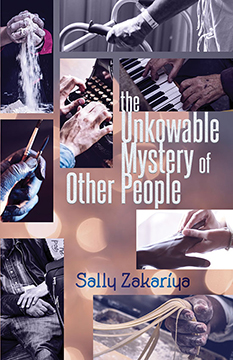 My good friend poet and children’s book author Jacqueline Jules and I meet every month to read and critique each other’s recent work. “Oh, another of your people poems,” Jackie would say as I handed over a few more poems about, well, people … some of whom I knew in childhood, some relatives and acquaintances, and some I had simply observed. (After all, in the old days before we were more carefully correct with language, British poet Alexander Pope famously said, “The proper study of mankind is man.”) I decided to gather some of my “people poems” together as a chapbook and shop the manuscript around. The result, The Unknowable Mystery of Other People, was a finalist in the 2018 Poetry Box. chapbook contest and is available until February 20 at a pre-release discount price of $10. Here’s one of the poems:
My good friend poet and children’s book author Jacqueline Jules and I meet every month to read and critique each other’s recent work. “Oh, another of your people poems,” Jackie would say as I handed over a few more poems about, well, people … some of whom I knew in childhood, some relatives and acquaintances, and some I had simply observed. (After all, in the old days before we were more carefully correct with language, British poet Alexander Pope famously said, “The proper study of mankind is man.”) I decided to gather some of my “people poems” together as a chapbook and shop the manuscript around. The result, The Unknowable Mystery of Other People, was a finalist in the 2018 Poetry Box. chapbook contest and is available until February 20 at a pre-release discount price of $10. Here’s one of the poems:Requiem for a Nobody
By Sally Zakariya
Unknown, unsung, no obituary
to spell out the bare facts of his life,
just one of the many to perish alone
on the street, hand still outstretched
for help that would not come.
Lord have mercy on his soul,
his nameless soul.
Death knew his name, called him by it,d
where he slipped by mostly unseen,
wrapped in a tattered gray blanket.
Death found him where he waited,
cheeks fallen in, eyes dimmed,
invisible to people bustling by.
Once someone tied his shoes, held
his hand, kissed his baby cheek,
but there will be no Pieta for him.
our oblivious souls. Did I say discount? Did I say February 20? Here’s where to order: The Unknowable Mystery of Other People. Thanks for the idea, Jackie – and thanks, Poetry Box. .................................................................................................................................... Words to Write By “Sometimes the poems come so fast that certain words are actually placeholders for the real words that are supposed to be there,” said poet Li-Young Lee, “and the work is to go back and figure out which words are the placeholders and which words are destined.” In other words, as the postcards that come every year from the Poetry Society of America say, “Revise, revise.” ..................................................................................................................................... The Fine Art of Blurbing A poetry blog with the delightful name Blogalicious recently addressed the fraught business of writing blurbs that will, the idea goes, encourage people to buy and read a book. Written by poet and publisher Diane Lockward, the post points some stern fingers at bad blurbs – those that say too little, those that make wild claims, those that are little more than quotes from the book. “I like blurbs that tell me something specific about the collection, something that will let me know if it’s for me or not,” writes Lockward in The Blurbification of Poetry Books. “I intensely dislike generic blurbs that could have been pasted onto the back of any number of books and give no evidence that the blurber even read the book being blurbed.” Reading her post reminded me how much we poets support each other – and depend on each other. I’m enormously grateful for the good people who have written blurbs for my chapbooks and am ready to return the favor. ..................................................................................................................................... Fish and Apples
 It’s snowing as I write this, tiny flakes that mean business. I like watching snow but not being out in it, and my mind turns to other seasons. Summer canoeing on Pleasant Pond at my aunt’s old cabin in Maine. Fall in the backyard of my childhood, picking up apples and tossing them for our dog Dusty to fetch.
It’s snowing as I write this, tiny flakes that mean business. I like watching snow but not being out in it, and my mind turns to other seasons. Summer canoeing on Pleasant Pond at my aunt’s old cabin in Maine. Fall in the backyard of my childhood, picking up apples and tossing them for our dog Dusty to fetch.Maine brings me to a poem by my friend Eric Forsbergh, author of Imagine Morning and a frequent contributor here. Eric, by the way, is no rank amateur: Carolyn Kreiter-Foronda, former poet laureate of Virginia, has called his poems “insightful, lyrical, and compassionate.” He’s writing mostly about DNA these days. (I sense another book of poems on the way.) Meanwhile, he’s made a few tweaks to a poem that first appeared in Imagine Morning and sent it here:
Of a Fish Laid Onto a Dock
By Eric Forsbergh
Disproportionate, the glass eyes
are fixed.
And what if
they could follow you
as you prepare to lift
the solemn texture of the flesh?
It flips against the boards,
rapid slapping dying down.
Nothing bleeds,
not slender articulations
of white bone lips
torn
to free the barb.
Gills in garnet fronds fan out
flexing open shut open shut:
the act of drowning.
Until you cup your hand prayer-like
behind its slippery head,
touch with your thin-honed knife
and push.
Apple Augury
“If you wish to make an apple pie from scratch, you
must first invent the universe.”
-- Carl Sagan
Between the birds and worms back then, Two Birds
Across our northern skies, two birds
We cannot know ourselves without knowing the natural world.
Rebellion is adolescent; acceptance is maturity.
A poem arrives like a hand in the dark.
Maturity is to care more for a precious few
things, and much less about much else. Murmuration of Starlings
Dancing in the eastern sky A Cold Tuesday in Mid-March
Today holds no mercy for her-- Hospital Lobby
I’ve been to all of them, he says,
we lost half the apples from our backyard
trees and rushed to gather the ripe ones
that survived.
We loved the trees, their branches spread
like open arms, their sweet and heavy fruit,
their sturdy trunks two stalwart sentinels
on the lawn.
We loved the applesauce and apple
goody Mother made each year, loved
helping her put up stewed apples
for the wintertime,
rows of jars lined up next to tomatoes
and corn and watermelon pickle on the
curved shelves beneath the cellar stairs --
homey cornucopia.
A is for apple, the alpha fruit, the first
one babies name. Apple primeval,
fruit of the tree. How many seeds, how
many sins.
Peeling apples for a pie these days, I scatter
the stems and look for answers in the runes,
a kind of apple augury, like casting the bones
to see what’s coming next.
....................................................................................................................................
A Loss
Prominent Israeli writer, novelist, journalist, and intellectual Amos Oz died in late December. Even reading him in translation, you sense the spare beauty and tension in his words. The January 14 issue of The New Yorker includes a moving Oz story from 1963, “All Rivers.” The careful, almost clumsy, way the narrator tells his story, forever worrying about what came first, shows Oz at his most empathetic yet controlled. Read it.
But what I will remember most about Oz is what he is said to have replied when asked why he wrote about sad people. “Happy people,” he said,” tell their own stories.”
.....................................................................................................................................
Mature Love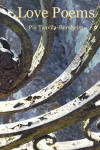 In the sweet heat of romance, young lovers may not realize how greatly their feelings for each other can endure and grow over time. But looking back on 40-some years of marriage, I know the love I feel for my husband now is not the same love I felt when we first married. It’s stronger, deeper, different … more mature.
My Poetry Society of Virginia friend Pia Taavila-Borsheim comes to the idea of mature love from a different angle. After many years as a widow and single mother, Pia celebrates a late marriage in her new chapbook Love Poems, a clear-eyed, sensual homage to, yes, mature love. I recommend all the poems in this wise collection, but I especially like the many in which Pia turns her eye upward to the skies and the birds that fly in them. Here’s one of those poems:
In the sweet heat of romance, young lovers may not realize how greatly their feelings for each other can endure and grow over time. But looking back on 40-some years of marriage, I know the love I feel for my husband now is not the same love I felt when we first married. It’s stronger, deeper, different … more mature.
My Poetry Society of Virginia friend Pia Taavila-Borsheim comes to the idea of mature love from a different angle. After many years as a widow and single mother, Pia celebrates a late marriage in her new chapbook Love Poems, a clear-eyed, sensual homage to, yes, mature love. I recommend all the poems in this wise collection, but I especially like the many in which Pia turns her eye upward to the skies and the birds that fly in them. Here’s one of those poems:
By Pia Taavila-Borsheim
charge and wheel, the smaller sleek
in hot pursuit. Perhaps the larger
skulked to raid the newborn nest.
Perhaps a tuft of food its beaked
desire lured. Whatever the cause
of this flight's rage, they grapple, peck,
fall and swoop. The chaser nips
the other's tail, ignores the odds,
defying physics, brave in sheer
revenge, aloft. I watch them wing
throughout the morn, then turn to walk
long-rutted fields. Briars, hawthorn
rise to snag. Their gnarled beauty
hosts a single feather, black.
....................................................................................................................................
Telling the Truth
Epigrams succeed where epics fail, says a Persian proverb, and Egyptian-American poet and essayist Yahia Lababidi began taking those words to heart as a young boy. Before the days of Twitter and memes, Lababidi began distilling what he calls his soul’s dialogue with itself into aphorisms, pithy statements of principle or even truth. In Where Epics Fail., Lababidi’s second book of aphorisms, truths abound:
You can’t bury pain and not expect it to grow roots.
They are not virtues if we are overly aware of them.
Our vices make a hell of solitude, our virtues a heaven.
 Or turn to page 204 and
consider the first two aphorisms:
Or turn to page 204 and
consider the first two aphorisms:
Maturing
is sweetening.
....................................................................................................................................
Murmuring On my bucket list, if I had one, would definitely be watching a murmuration of starlings. That’s what it’s called when hundreds, sometimes thousands, of starlings fly in swooping, intricately coordinated patterns through the sky. Seeing a murmuration in person would be amazing, but meanwhile I’ve watched videos on YouTube, including one that’s especially mesmerizing.. And (you knew this was coming), I’ve written about the phenomenon, too. Here’s my poem, which appears in the current issue (volume 31) of riverSedge:
On my bucket list, if I had one, would definitely be watching a murmuration of starlings. That’s what it’s called when hundreds, sometimes thousands, of starlings fly in swooping, intricately coordinated patterns through the sky. Seeing a murmuration in person would be amazing, but meanwhile I’ve watched videos on YouTube, including one that’s especially mesmerizing.. And (you knew this was coming), I’ve written about the phenomenon, too. Here’s my poem, which appears in the current issue (volume 31) of riverSedge:
By Sally Zakariya
a bird cloud pulses out
draws in, widening
and turning all together--
a swirl of starlings,
wings in synchrony,
each bird imperceptibly
invisibly, communing
with the birds nearby,
balancing uncertainty
and consensus
A rule of seven, science
says, and more a matter
of physics than biology--
each small group poised
on the edge of transformation,
like crystals forming, liquids
turning into gas, metals
becoming magnetized.
But what a wonder, this
murmuration--a ribbon
of flight unfurled against
the sky, eddy and churn
of a thousand wings
thrumming with life.
....................................................................................................................................
At the Traffic Light
“Thanks for reading my poem,” the email began, but thanks really are due to Michigan poet Claire Weiner. “I’m a clinical social worker and mindfulness teacher when I’m not writing poetry, short stories, and creative nonfiction,” she went on to say. You can see that thoughtful background in the little drama playing out at the traffic light in the poem she sent us:
By Claire Weiner
the woman with the bad dye job
who struggles across Carpenter Road
with a shopping cart of groceries in plastic bags.
She’s come from the discount food market
or maybe from CVS, using coupons
to buy groceries--cans of soup, crackers,
a small jar of peanut butter, an iridescent orange
rectangle of cheese, along with her cigarettes.
The cart isn’t supposed to leave
the parking lot, but she’d be doomed without it
As it is, she has barely enough time
to cross with the green light, the March wind blows
against her, her sweatshirt insufficient for the feeble sun
and occasional snowflake.
I wait at the light in my late model car with heated seats,
full of nonessential purchases from Target and wonder
what would happen if I offered her a ride.
But what would she do with the cart?
When the light changes, I step on the gas.
....................................................................................................................................
Unknowable Mystery While my new chapbook Personal Astronomy was still at the printer, I got the exciting news that another chapbook manuscript, “The Unknowable Mystery of Other People,” was accepted for publication by The Poetry Box. A finalist in that publisher’s 2018 chapbook competition, this collection is all about various people … friends, family, strangers, and in between. It won’t be published until sometime this winter, but meanwhile, here’s one of the poems:
While my new chapbook Personal Astronomy was still at the printer, I got the exciting news that another chapbook manuscript, “The Unknowable Mystery of Other People,” was accepted for publication by The Poetry Box. A finalist in that publisher’s 2018 chapbook competition, this collection is all about various people … friends, family, strangers, and in between. It won’t be published until sometime this winter, but meanwhile, here’s one of the poems:
rocking back and forth, arms
wrapped around himself, every
shelter in the city, naming
them one by one, intoning
like a Biblical prophet
in a B movie. All of them.
Everyone looks away,
away
from this embarrassment
in frayed sweatpants and bedroom
slippers. Every single shelter,
rocking harder and deeper
like water coming to a boil.
All I want is money for the bus,
money and something to eat.
It takes a hospital official, brisk
in suit and badge, to lead him
away, promising a hot cafeteria
meal. Everyone is pleased.
Smiles of satisfaction. Problem
solved. Embarrassment gone.
I can’t make it on my own out
on the street, he says, but
now no one is listening.
....................................................................................................................................
Ordinary/Extraordinary
 I’ve been trying to catch up on some of the books about poetry that I might have read as an MFA student. I never was one, though, which explains why, in my 70s, I finally picked up
A Primer for Poets & Readers of Poetry, by Gregory Orr, who is called by the Poetry Foundation “the master of the short, personal lyric.” The book is an absorbing guide to writing and reading poetry, from the interplay of order and disorder in a poem to the wonderful ways poets use rhythm, sound, and imagination to bring their works alive.
I’ve been trying to catch up on some of the books about poetry that I might have read as an MFA student. I never was one, though, which explains why, in my 70s, I finally picked up
A Primer for Poets & Readers of Poetry, by Gregory Orr, who is called by the Poetry Foundation “the master of the short, personal lyric.” The book is an absorbing guide to writing and reading poetry, from the interplay of order and disorder in a poem to the wonderful ways poets use rhythm, sound, and imagination to bring their works alive.
One section that struck me particularly was a passage on, of all things, syntax. Citing the “dislocations and deeper entanglements of the American poet Hart Crane,” Orr quotes a difficult passage of Crane’s “Voyages” and calls it “an extremely expressive use of syntax, one that mocks the skeletal parsing of sentence with an image of fleshly, ecstatic flowing.
I couldn’t really follow the Crane passage, I confess, so I felt better when I read on. ”I would add, just to be clear about this,” Orr writes, that I’m not really able to make any ordinary sense out of these lines, even though I think they’re rather amazing.”
Exactly. I have a friend who writes poems that are striking for their sounds and images, but I can’t always make “ordinary sense” out of them. Even so, I think they’re extraordinary.
Yes, my chapbook Personal Astronomy is imminent (yay), and yes, I have another one coming this winter (more on that later). But now, in that aforementioned lull, I’d like to feature work by a couple of other, more inspired, poets.
..................................................................................................................................... Open Doors
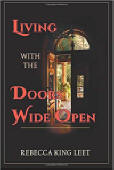 One such poet is my friend Rebecca Leet, whose new book,
Living with the Doors Wide Open, is now available on Amazon. In this collection, Rebecca brings her journalist’s skills of observation and her experience of a life well lived to a collection of engaging and accessible poetry. Her poems touch the universal behind the everyday, the sometimes difficult truth behind fallen leaves, a remembered piano composition, the burial of a beloved dog. Rebecca’s tone ranges from the bemused to the elegiac: “Time has tattooed itself / across my flesh,” she writes in one poem; in another, she hopes to “yield” one day with the grace of a falling leaf. “Stay facing the sun that warms you,” she whispers to a rose that, like many of us, is “a few petals toward autumn.”
One such poet is my friend Rebecca Leet, whose new book,
Living with the Doors Wide Open, is now available on Amazon. In this collection, Rebecca brings her journalist’s skills of observation and her experience of a life well lived to a collection of engaging and accessible poetry. Her poems touch the universal behind the everyday, the sometimes difficult truth behind fallen leaves, a remembered piano composition, the burial of a beloved dog. Rebecca’s tone ranges from the bemused to the elegiac: “Time has tattooed itself / across my flesh,” she writes in one poem; in another, she hopes to “yield” one day with the grace of a falling leaf. “Stay facing the sun that warms you,” she whispers to a rose that, like many of us, is “a few petals toward autumn.”Mothering Backwards
By Rebecca King Leet
I’m sorry, she says, what Gift
are your daughters’ names?
Those, twenty-five and twenty-six,
for whom she’d drawn down
Social Security each month
to ensure they’d go to college. And
whose University of Virginia sweatshirt
and William and Mary tee she’d worn
proudly. She’d sit stone still, listening
to each story Caitlin and Kristin shared.
I don’t remember – what
are your daughters’ names –
asks the woman who was my mother
of the woman who is her mother now
.....................................................................................................................................
‘The Body that Smiles’ “I heard the owls tonight,” my friend Janet Dinsmore emailed me recently. Janet, who has attended a series of poetry classes with me, told me she has been looking for her voice in poetry for many years. She was standing outside her cottage near the Chesapeake Bay one evening when she heard the owls.
“I heard the owls tonight,” my friend Janet Dinsmore emailed me recently. Janet, who has attended a series of poetry classes with me, told me she has been looking for her voice in poetry for many years. She was standing outside her cottage near the Chesapeake Bay one evening when she heard the owls.
By Janet Dinsmore
Owls are communing
in the soft dark
wooh wooh, a soprano
then an alto and another
I smile on the gravel road
actually
I am inside the body that smiles,
the body smiling with my face
mouth curved happy up
unbidden, unintended…
the independent inner one
on its private
unpredictable
purer path
 Rejection. Rejection. Rejection. It’s hard to keep submitting work for publication when everything comes back “thanks but no thanks.” And then suddenly comes acceptance of not one but
three poems at the same time! In the same journal! Thank you, thank you
Foliate Oak Literary Magazine. for publishing “Artic Fever,” “Still With Us,” and “Bathtub Buddha” in your May issue. It’s enough to make me keep on writing, keep on submitting.
Rejection. Rejection. Rejection. It’s hard to keep submitting work for publication when everything comes back “thanks but no thanks.” And then suddenly comes acceptance of not one but
three poems at the same time! In the same journal! Thank you, thank you
Foliate Oak Literary Magazine. for publishing “Artic Fever,” “Still With Us,” and “Bathtub Buddha” in your May issue. It’s enough to make me keep on writing, keep on submitting.Bathtub Buddha
By Sally Zakariya
Watching the water swirl down
the drain
I think of Australia –
does it really circle the other way
in the southern hemisphere
left hand one way, right hand
the other?
Do the gyres cancel each other out
when they collide at the equator
clogging the drain
bathwater rising
a flood of soap and bubbles
bathing the earth?
No it can’t be – the world
is too steeped in dirt and grime
to be cleansed so easily.
Even the rain that showers down
from Heaven
can’t wash the stains clean
without help from our tears.
In sections called 1) find literary journals, 2) follow directions, 3) cover letters matter [sort of], 4) keep good records, and 5) keep submitting, Manning gives a quick course in the art of getting your poems out there and in print or online.
“If you’re not one of those rare, lucky poets who have poems accepted on the first try, don’t worry,” she writes. “Most of us took a long time to get a first poem published, and sometimes even well-published poets have dry spells. Submitting poetry can be discouraging, but keep doing it.” Words to live by. After all, as Manning observes, it’s a numbers game. The more you submit, the more likely you’ll get one of those good-news acceptance emails. ..................................................................................................................................... There’s still time If you’ve been meaning to order my forthcoming chapbook Personal Astronomy but haven’t gotten around to it, never fear. The chapbook is slated for publication in mid-August, and there’s still time to reserve your copy. The poems “express a stargazer’s wonderment, doubt and acceptance of the extraordinary grounded in an ordinary life,” says one reviewer. Another calls the collection “a poetic journey into the microcosm of love and relationship juxtaposed against the backdrop of the universe in poems that are as lucid and ordered as the constellations they invoke.” Buy a copy and the stars will shine on you. ..................................................................................................................................... Coming Soon(ish)
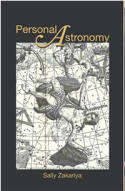 My forthcoming chapbook “Personal Astronomy” is now available for pre-order from
Finishing Line Press. I’d like to think people will enjoy the poems inside, and I’m hoping they’ll like the cover illustration as well. It’s a detail from a star chart by Johann Elert Bode (1747-1826) showing the constellation Andromeda. (That’s her, reclining among the stars.)
When I first mentioned
"Personal Astronomy". here a couple of months ago, I included a poem that will be in the chapbook, “Constellations.” Poet Dianne Silvestri responded with a poem of her own. (Dianne, by the way, wrote the charming “Summer Treasure” in
Joys of the Table..)
“Since you invited correspondence,” she wrote me, “I am drawn to send you a poem of mine I recently resurrected which I thought of as I read your ‘Constellations.’”
My forthcoming chapbook “Personal Astronomy” is now available for pre-order from
Finishing Line Press. I’d like to think people will enjoy the poems inside, and I’m hoping they’ll like the cover illustration as well. It’s a detail from a star chart by Johann Elert Bode (1747-1826) showing the constellation Andromeda. (That’s her, reclining among the stars.)
When I first mentioned
"Personal Astronomy". here a couple of months ago, I included a poem that will be in the chapbook, “Constellations.” Poet Dianne Silvestri responded with a poem of her own. (Dianne, by the way, wrote the charming “Summer Treasure” in
Joys of the Table..)
“Since you invited correspondence,” she wrote me, “I am drawn to send you a poem of mine I recently resurrected which I thought of as I read your ‘Constellations.’” August Midnight
By Dianne Silvestri
The ranger locked the gate
at sundown, our group inside
to camp at Bluffton Game Preserve.
We unrolled sleeping bags
like planks to bridge the road,
lay wide-eyed to observe
unobstructed midnight sky
of August set to astound us
with one shooting star after another,
all sites on the map overhead
firing meteors in rapid succession.
No one died while asleep
in the middle of that asphalt.
When we awoke the next morning,
in fact, we were all more alive.
Insomnia, 4 AM
The end of the world comes when you’re awake
the dark clamor, the rush of wings,
the taste of copper in your throat,
the jagged wire of dread dragged
through your veins and capillaries.
You don’t get to sleep through this.
The moon may hang a jaunty lantern
outside your window, but you see the scowl
on its face, you grasp the sheer dimension
of the final freeze.
No welcome thaw to come. No cozy sleep.
Not even dreams of sleep.
When the end of the world comes
you will still be awake.
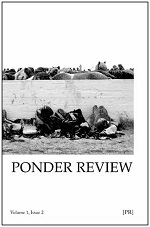 A recipe box is a little history not just of
dishes you love but also of the people who
taught you how to make them. Take dessert: Even
though I try to stay away from cakes and pies
these days, that wasn’t always the case.
Flipping through the recipes in my box brings
family members and old friends sweetly to mind.
My thanks to the Mississippi University for
Women for including this poem in the Fall 2017
issue of
Ponder Review:
A recipe box is a little history not just of
dishes you love but also of the people who
taught you how to make them. Take dessert: Even
though I try to stay away from cakes and pies
these days, that wasn’t always the case.
Flipping through the recipes in my box brings
family members and old friends sweetly to mind.
My thanks to the Mississippi University for
Women for including this poem in the Fall 2017
issue of
Ponder Review:Their Desserts
By Sally Zakariya
Robin, who couldn’t hide her
innocence, maker of poppy
seed cake,
unhappy in love, leaning toward the nunnery
last I heard
Jeanne of the
freckles and flaming orange hair, never quite
one of our group
and remembered mostly for her
carrot cake
Willie,
practical Midwesterner who did it all a year
ahead
and better, who
served flaky almond pastry from her
Dutch forebears
friends and
family all filed together in the old recipe box
under Cakes and
Cookies along with others -- Mother’s
there of course
no baker, still
we relished her peach skillet pie and apple
goodie, sweet
memories neatly recorded in her own left-
leaning hand
Nancy, too, big
sister who settled into a domesticity I envied
but failed to
emulate (I never make her pecan pie but savor
the recipe)
and you, Aunt
Betty, your spice cake topped with tangy lemon
sauce deserves a poem of its own, warm and
pungent, starting
with the same
simple stuff as all the rest -- flour, butter,
sugar, eggs
-- but how
various the cooks, how various their desserts
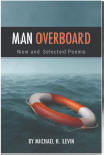 I’m always delighted to see new work by poets I
know, even if I only know them through
publishing. Case in point: Michael H. Levin,
whose delicious poem “Jiro Dreams of Sushi”
(after the movie by the same name) appeared in
Joys of the Table. Levin’s new collection,
Man
Overboard, is now available for preorder from
Finishing Line Press.
I’m always delighted to see new work by poets I
know, even if I only know them through
publishing. Case in point: Michael H. Levin,
whose delicious poem “Jiro Dreams of Sushi”
(after the movie by the same name) appeared in
Joys of the Table. Levin’s new collection,
Man
Overboard, is now available for preorder from
Finishing Line Press.“Michael Levin’s poems are a captivating collection of dramatic slices of life netted over the course of decades,” writes one critic, and another adds, “Levin’s poetry circumnavigates the globe like a time-traveling Indiana Jones and sticks a shiny fork deep into earth’s volcanic heart.”
The title poem, which first appeared in Poetica Magazine, tells a tragic story with Levin’s characteristic economy and Imagination
Man Overboard
(C.G.R., d. 2004)
By Michael H. Levin
Dark head bobbing in a
chevron wake
disconnected as the space surged
you slipped through the O
of our grasp.
Cool as Wisconsin, you forgot
safe dreams are toxic, that fear is how we fly
--
stood off, maneuvering. We scan your log now
seeking its theme.
Cold virtues are an ancient curse --
they reek of Artemis and Mimë.
To wall one’s heart with denial, is to
starve the self away.
Our saving grace is to open
like glories; for openness is all
the earth we have, we dots on the
sliding gray plates
of a following sea.
 Bon
Appetit
Don’t forget to “Like” our
Joys of the Table Facebook page. And check
back often! We’re adding poems and recipes from
time to time and would love to hear from you.
....................................................................................................................................
Bon
Appetit
Don’t forget to “Like” our
Joys of the Table Facebook page. And check
back often! We’re adding poems and recipes from
time to time and would love to hear from you.
.................................................................................................................................... What
Are You Writing?
Why should we get all the
bylines? Submit your latest poem—just one for
now—and we’ll publish the poems we like best in
an upcoming blog post. Simultaneous submissions
are fine, but please let us know if the poem is
accepted or published elsewhere. Send your poem,
plus a few lines about yourself, in the body of
an e-mail message to:
poetryeditor@RicherResourcesPublications.com
You
Are Here
Welcome to
But Does it Rhyme?
INVITE US TO YOUR INBOX! Would you like to
receive our monthly newsletter? Sign up
here.
We're a
small, but hopefully growing, band of poets who
like to talk about our craft and share what
we've written. We'll highlight favorite poets,
review new books, and explore the process of
writing poetry from inspiration to conclusion.
(We might venture into essays and short fiction,
too.) We hope you'll like our blog — and
contribute your own thought and poems.
Sally Zakariya, Poetry Editor
Richer Resources Publications
Charan Sue Wollard
(LivermoreLit)
Kevin Taylor
(Poet-ch'i)
Sherry Weaver Smith
(SherrysKnowledgeQuest)
Richer Resources Publications/em>
ARCHIVES